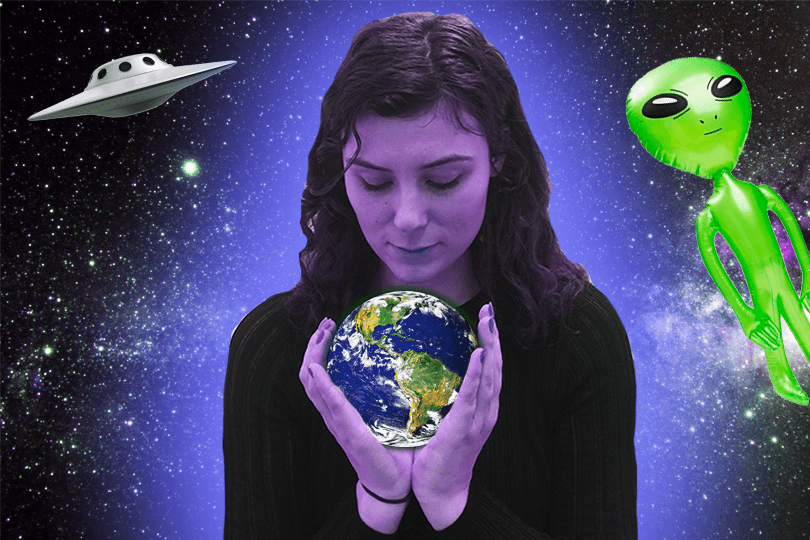Plastic Free July is over, but Josie Adams is still fighting for the environment. After a month of minimising plastics, emissions and even recyclables, she reflects on what she’s learned.
You can read the first three diary entries here, here, and here.
July has ended and so has my time as New Zealand’s most formidable force for environmental change. I am no longer plastic-free: I bought a five-pack of mi goreng as soon as the calendar ticked over to August 1st. I am no longer emissions-free: I drove a car all the way across town, enjoying travelling in full isolation from the outdoors and the public for the first time in a month.
After three days of eating individually-wrapped lollies, shopping online, and burning gas I was finally struck down by climate anxiety. I saw a seagull stuck in a plastic bag and, even though I hate seagulls and it wasn’t my bag, I felt guilty.
Lean, green crisis-fighting machine Miriama Kamo warned me I wouldn’t be able to revert to my old ways, and she was right. I’ve taken the red pill. I can’t go back. Everywhere I look, I see waste. I’m well into the new month and still baking my own bread, using shampoo bars, and composting.
Minimising consumption of plastics is still my number one goal, but when it’s not possible I now know which plastics to choose: rPET or plastics 1 and 2 (see: the number inside the little recycling triangle). The other numbers need to be sent overseas for processing.
The fact we send rubbish overseas is possibly the most shocking thing I learned this month. We’re staying “clean” and “green” by polluting other countries instead of our own. The climate doesn’t care where the pollution is coming from, guys; we’re all screwed.
It’s easy to feel powerless in the face of a global crisis. I’m well aware how limited my power to change the world is. Consumers like me want to be better, but don’t have the options. Medical and pharmaceutical waste is huge; they’re big on single-use plastics for hygiene reasons. Vegan and vegetarian food products, too, are huge waste culprits, which is totally antithetical to the vegan lifestyle. Water, the essence of life, comes in a hundred different shapes of plastic. If there are any budding packaging entrepreneurs out there, that’s three areas to work on.
At the end of the day, it’s the government and businesses who must work to solve the problem; individuals can’t. I could consume nothing but fruit that falls off a tree in my backyard for the rest of my life, and it wouldn’t make a difference to the fate of the planet. My advice: take that Uber. Use a napkin if you have to. You’re not killing the planet all by yourself.
The difference you can make is in convincing larger entities to change. Write to your favourite businesses: – supermarkets, doctor’s clinics, pharmacies, clothing stores – and ask them to be better. Write to the council and the government so they can support industry-wide change. Join a movement.
Plastic Free July isn’t just an exercise in self-control; it’s a call to arms to do something, anything, about the climate crisis. Over the course of this month, it’s become clear that unless you invest in a fully off-grid set-up, you cannot be zero waste.
Throughout July I struggled to stay low waste, as is well-recorded. I had to take almost two hours of public transport to find a supermarket that was attempting to fulfill the eco-friendly shopping ideal of the future. I searched to no avail for plastic-free pasta. I couldn’t buy the corduroy pants of my dreams.
I understand that being low waste means making sacrifices, but please – not the pasta. Thankfully, every expert I spoke to over the month was optimistic about the future of plastic and waste. I say it every week: we’re in the middle of a culture shift.
Large businesses are taking steps to reduce their footprints, as well as encouraging customers to do the same: a tomato producer generates their own energy, a supermarket sends its unwanted produce to local fruit stands, and there’s now a blanket single-use plastic bag ban.
None of this would have happened without demand from a few vocal sources. Businesses, by and large, understand they need to make an effort. We need to convince them it’s worth their while. Despite every New World in the North Island offering a BYO container scheme, I’ve seen almost no-one bringing containers to the store.
The shift to a low-waste society needs incentives from councils, action by businesses, and demand from consumers. You’re not killing the planet by yourself, and you can’t save it by yourself. Try walking the talk – and talking the talk, loudly – and see how much better you feel, even if it’s just because you’re breathing less smog.
This article was created in paid partnership with New World. Learn more about our partnerships here.

